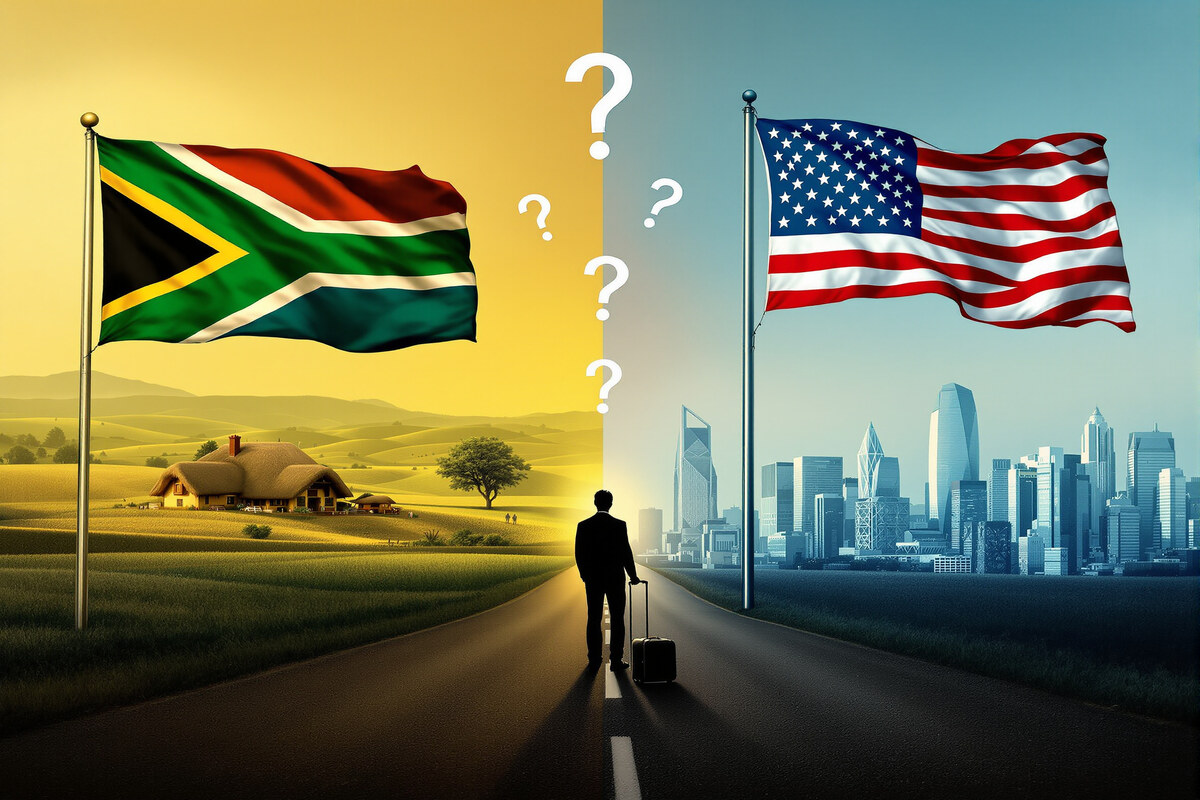
Afrikaners in the US: Expats or refugees?
Loophole or Lifeline? 59 Afrikaners touch down in the US as official refugees in 2025 while “real” war refugees remain stuck in the queue.

Van der Merwe walks into a bar in Dallas and orders a beer. The bartender asks, “So, are you an expat or a refugee?” Van der Merwe pauses. “Ja, good question…” When 59 Afrikaners arrived at Dulles Airport in May 2025 under official refugee status, it sparked a debate that’s more complicated than it first appears.
Right, full disclosure: I wasn’t much good at Afrikaans at school. Barely scraped through matric, so I’m probably the last person wading into this. But when those charter flights started landing in the US with Afrikaners claiming refugee status, I couldn’t help wondering wait, can you do that?
The Tale of the 59 Afrikaners
Here’s what actually happened: 59 Afrikaners touched down at Dulles Airport in May 2025 on a government-chartered flight. They were greeted by State Department officials, processed in months (not years), and officially designated as refugees under Trump’s executive order. Another 9 arrived shortly after. The State Department had received 8 000 enquiries about the programme.
Meanwhile, refugees from actual war zones? Door closed. Syrian families? Nope. Venezuelan asylum seekers? Suspended. But this one very specific group? Red carpet treatment.
Here’s the kicker: in fiscal year 2024, exactly zero South Africans were resettled in the US as refugees. Zero. Then suddenly…
What’s in a word?
Let’s see what Oxford actually says:
Expatriate: “A person living in a country that is not their own, usually by choice.”
Refugee: “A person who has been forced to leave their own country because they are in danger.”
Asylum Seeker: “A person who has been forced to leave their own country because they are in danger and who arrives in another country asking to be allowed to stay there.”
See those keywords? “By choice” versus “forced” versus “in danger.” It’s not just semantics, it’s literally the difference between waiting years for a visa and being flown in on a chartered plane.
The Uncomfortable Bit
According to Oxford’s own data, the words that most commonly appear with “expat” are: British, American, Indian, Canadian, Australian.
Words that appear with “immigrant”? Illegal, undocumented, Mexican, legal, Chinese.
Words with “refugee”? Syrian, Palestinian, Afghan, Somali, Sudanese.
So when predominantly white, English-speaking South Africans arrive on government charters and get called “refugees”… ag, you can see why people have questions, né?
But are they actually refugees?
The Trump administration claimed Afrikaners were facing “genocide” and “race-based persecution.” The South African government said, essentially, “eish, that’s a bit dramatic.”
Many of the new arrivals spoke English, a third had relatives already in the US, and some cited violence that happened 25 years ago. They mentioned not trusting the police and general safety concerns – fair enough, but don’t millions of South Africans of all races share those exact same worries?
So what’s the answer?
Here’s where I admit I genuinely don’t know. Are they:
- Expats who found a political loophole to skip the visa queue?
- Refugees genuinely fleeing persecution?
- Something in between – people whose privilege and politics aligned at exactly the right moment?
The fear these folks feel is real. The violence in SA exists. But does it meet the international threshold for refugee status? The South African government says no. The Trump administration says yes. Everyone else is just confused.
It’s a bit like claiming refugee status from Camps Bay because of property crime, innit? Technically the crime exists. Technically you’ve left. But…
Your Turn
Honestly? I don’t have the answer. I barely passed Afrikaans at school and I’m clearly not cut out for international refugee law either.
Are they expats or refugees? Does it even matter? Is the whole debate missing the point?
Drop your thoughts on our socials – because one thing’s certain: those 8 000 people waiting for the next flight aren’t worried about semantics.
